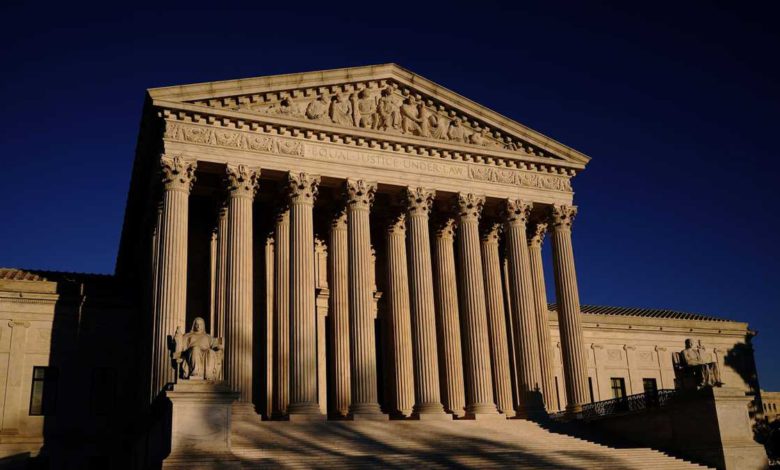
In what will be one of the most monumental endeavors of Joe Biden's presidency, the retirement of Stephen Breyer sets the stage for an immensely important decision by the President.Breyer's seat may be the only one that Biden fills on the Supreme Court, and it may not be one he fills at all — if Republicans retake the Senate before the president's choice for a replacement is confirmed.On the campaign trail, Biden vowed to put a Black woman on the high court, which would be a historic first. A shortlist of potential nominees had been circulating Washington well before Breyer's retirement plans became public, and officials in the White House Counsel's office built files on various candidates in anticipation of a potential vacancy. Now, those efforts will ramp up significantly and the President will likely hold one on one meetings before announcing his pick.The White House is stacked with officials deeply familiar with the confirmation process, starting with Biden himself — who chaired the Senate Judiciary Committee — as well as White House chief of staff Ron Klain, who has experience both at the White House counsel's office and working for the Senate Judiciary Committee.With Democrats holding the narrowest of majorities in the upper chamber, Biden will have to choose someone who can safely get 50 votes in the Senate (Vice President Kamala Harris could provide the tie-breaking vote if the Senate is split on the nomination). In addition to the vote count, Biden also has to keep an eye on the calendar. Senate Republicans are likely to retake the chamber in this year's midterms and have already signaled they would block a Biden nominee to the Supreme Court. It typically takes two to three months for a President to see his nominee confirmed by the Senate once he or she is named. The most recent justice, however, was confirmed in just a month and a half, as Senate Republicans rushed to get Justice Amy Coney Barrett approved before the 2020 election.Given the disappointments that have been recently dealt to the progressives under the Biden administration — between the congressional demise of the president's Build Back Better proposal and his failure to find a way forward on voting rights legislation — Biden's choice for the Supreme Court gives him the opportunity to reinvigorate the Democratic base. If she is confirmed, Biden will secure a much-needed victory for his administration.Here are potential nominees who have been on observers' short list:DC Circuit Judge Ketanji Brown Jackson Biden has already elevated Judge Ketanji Brown Jackson once, appointing her last year to the U.S. Court of Appeals for the District of Columbia, which is considered the second-most powerful federal court in the country. Previously, the 51-year-old judge served on the federal district court in D.C. Because of that appellate appointment, she's already been through a vetting process that included an interview with the president himself. Fittingly, she clerked for Breyer and holds degrees from Harvard and Harvard Law School. She also served as an assistant federal public defender, making her a prime example of Biden's White House focus on appointing judges with backgrounds that are outside the typical prosecutor and Big Law box.As a judge, Jackson has ruled on high-profile cases including the Don McGahn congressional subpoena lawsuit (where, as a district court, she ordered the former Trump White House counsel to comply with the House's subpoena). As an appellate judge, she signed on to the recent opinion ordering the disclosure of Trump White House documents being sought by the House Jan. 6 committee — a case Trump has now asked the Supreme Court to review. If she is confirmed to the court while the justices were still considering the case, she'd likely be asked to recuse.California Supreme Court Justice Leondra Kruger Kruger, now 45, was the youngest person to be appointed to the California Supreme Court when then-Gov. Jerry Brown nominated her in 2014.Kruger is intimately familiar with the Supreme Court having worked as a clerk for the late Justice John Paul Stevens and served as acting deputy solicitor general in the Obama administration. While in the Solicitor General's office, she argued 12 cases in front of the Supreme Court representing the government. At the Justice Department, she also earned the Attorney General's Award for Exceptional Service, the department's highest award for employee performance, in 2013 and 2014.At the California Supreme Court, she has authored notable opinions on the 4th Amendment — holding that law enforcement could not search a woman's purse without a warrant after she declined to provide a driver's license — and upholding a California law that requires law enforcement to collect DNA samples as well as fingerprints from all persons arrested for or convicted of felony offenses.Though she is said to be well-liked among the alumni of the Solicitor General's office, she has not yet received the thorough vetting that other potential nominees have gone through.South Carolina U.S. District Court Judge J. Michelle Childs Childs, a judge on South Carolina's federal court, is said to have a major booster in House Majority Whip James Clyburn, a Biden ally who helped deliver South Carolina for the eventual nominee in the 2020 Democratic primary. Just last month, Biden nominated Childs to the U.S. Court of Appeals for the District of Columbia Circuit, and the nomination remains pending.A graduate of the University of South Carolina School of Law, Childs does not have the Ivy League pedigree shared by eight of the nine justices. Her cheerleaders have touted her public-school education and other elements of her background as an advantage for Democrats, according to a 2021 New York Times report, and as a way to fight back against claims that the party has become too elitist in its makeup.In addition to a decade spent in private practice, the 55-year-old served as a state court trial judge on the South Carolina Circuit, as the deputy director of the South Carolina Department of Labor, Licensing and Regulation, and as a commissioner on the South Carolina Workers' Compensation Commission.Other names that have been floatedDistrict Judge Wilhelmina "Mimi" Wright, a judge on Minnesota's federal district court whose consideration would likely please Sen. Amy Klobuchar, the Minnesota Democrat who sits on the Judiciary Committee.Circuit Judge Eunice Lee, a former New York public defender whom Biden nominated to the Second Circuit on the recommendation of Senate Majority Leader Chuck Schumer.Circuit Judge Candace Jackson-Akiwumi, an alumna of Chicago's public defender's office whose appointment by Biden to the Seventh Circuit was cheered by Senate Judiciary Chair Dick Durbin of Illinois.Sherrilyn Ifill, a civil rights attorney who recently announced plans to step down from her role as President and Director-Counsel of the NAACP Legal Defense and Educational Fund.
In what will be one of the most monumental endeavors of Joe Biden's presidency, the retirement of Stephen Breyer sets the stage for an immensely important decision by the President.
Breyer's seat may be the only one that Biden fills on the Supreme Court, and it may not be one he fills at all — if Republicans retake the Senate before the president's choice for a replacement is confirmed.
On the campaign trail, Biden vowed to put a Black woman on the high court, which would be a historic first. A shortlist of potential nominees had been circulating Washington well before Breyer's retirement plans became public, and officials in the White House Counsel's office built files on various candidates in anticipation of a potential vacancy. Now, those efforts will ramp up significantly and the President will likely hold one on one meetings before announcing his pick.
The White House is stacked with officials deeply familiar with the confirmation process, starting with Biden himself — who chaired the Senate Judiciary Committee — as well as White House chief of staff Ron Klain, who has experience both at the White House counsel's office and working for the Senate Judiciary Committee.
With Democrats holding the narrowest of majorities in the upper chamber, Biden will have to choose someone who can safely get 50 votes in the Senate (Vice President Kamala Harris could provide the tie-breaking vote if the Senate is split on the nomination). In addition to the vote count, Biden also has to keep an eye on the calendar. Senate Republicans are likely to retake the chamber in this year's midterms and have already signaled they would block a Biden nominee to the Supreme Court. It typically takes two to three months for a President to see his nominee confirmed by the Senate once he or she is named. The most recent justice, however, was confirmed in just a month and a half, as Senate Republicans rushed to get Justice Amy Coney Barrett approved before the 2020 election.
Given the disappointments that have been recently dealt to the progressives under the Biden administration — between the congressional demise of the president's Build Back Better proposal and his failure to find a way forward on voting rights legislation — Biden's choice for the Supreme Court gives him the opportunity to reinvigorate the Democratic base. If she is confirmed, Biden will secure a much-needed victory for his administration.
Here are potential nominees who have been on observers' short list:
DC Circuit Judge Ketanji Brown Jackson
Biden has already elevated Judge Ketanji Brown Jackson once, appointing her last year to the U.S. Court of Appeals for the District of Columbia, which is considered the second-most powerful federal court in the country. Previously, the 51-year-old judge served on the federal district court in D.C. Because of that appellate appointment, she's already been through a vetting process that included an interview with the president himself. Fittingly, she clerked for Breyer and holds degrees from Harvard and Harvard Law School. She also served as an assistant federal public defender, making her a prime example of Biden's White House focus on appointing judges with backgrounds that are outside the typical prosecutor and Big Law box.
As a judge, Jackson has ruled on high-profile cases including the Don McGahn congressional subpoena lawsuit (where, as a district court, she ordered the former Trump White House counsel to comply with the House's subpoena). As an appellate judge, she signed on to the recent opinion ordering the disclosure of Trump White House documents being sought by the House Jan. 6 committee — a case Trump has now asked the Supreme Court to review. If she is confirmed to the court while the justices were still considering the case, she'd likely be asked to recuse.
California Supreme Court Justice Leondra Kruger
Kruger, now 45, was the youngest person to be appointed to the California Supreme Court when then-Gov. Jerry Brown nominated her in 2014.
Kruger is intimately familiar with the Supreme Court having worked as a clerk for the late Justice John Paul Stevens and served as acting deputy solicitor general in the Obama administration. While in the Solicitor General's office, she argued 12 cases in front of the Supreme Court representing the government. At the Justice Department, she also earned the Attorney General's Award for Exceptional Service, the department's highest award for employee performance, in 2013 and 2014.
At the California Supreme Court, she has authored notable opinions on the 4th Amendment — holding that law enforcement could not search a woman's purse without a warrant after she declined to provide a driver's license — and upholding a California law that requires law enforcement to collect DNA samples as well as fingerprints from all persons arrested for or convicted of felony offenses.
Though she is said to be well-liked among the alumni of the Solicitor General's office, she has not yet received the thorough vetting that other potential nominees have gone through.
South Carolina U.S. District Court Judge J. Michelle Childs
Childs, a judge on South Carolina's federal court, is said to have a major booster in House Majority Whip James Clyburn, a Biden ally who helped deliver South Carolina for the eventual nominee in the 2020 Democratic primary. Just last month, Biden nominated Childs to the U.S. Court of Appeals for the District of Columbia Circuit, and the nomination remains pending.
A graduate of the University of South Carolina School of Law, Childs does not have the Ivy League pedigree shared by eight of the nine justices. Her cheerleaders have touted her public-school education and other elements of her background as an advantage for Democrats, according to a 2021 New York Times report, and as a way to fight back against claims that the party has become too elitist in its makeup.
In addition to a decade spent in private practice, the 55-year-old served as a state court trial judge on the South Carolina Circuit, as the deputy director of the South Carolina Department of Labor, Licensing and Regulation, and as a commissioner on the South Carolina Workers' Compensation Commission.
Other names that have been floated
District Judge Wilhelmina "Mimi" Wright, a judge on Minnesota's federal district court whose consideration would likely please Sen. Amy Klobuchar, the Minnesota Democrat who sits on the Judiciary Committee.
Circuit Judge Eunice Lee, a former New York public defender whom Biden nominated to the Second Circuit on the recommendation of Senate Majority Leader Chuck Schumer.
Circuit Judge Candace Jackson-Akiwumi, an alumna of Chicago's public defender's office whose appointment by Biden to the Seventh Circuit was cheered by Senate Judiciary Chair Dick Durbin of Illinois.
Sherrilyn Ifill, a civil rights attorney who recently announced plans to step down from her role as President and Director-Counsel of the NAACP Legal Defense and Educational Fund.
Source link











